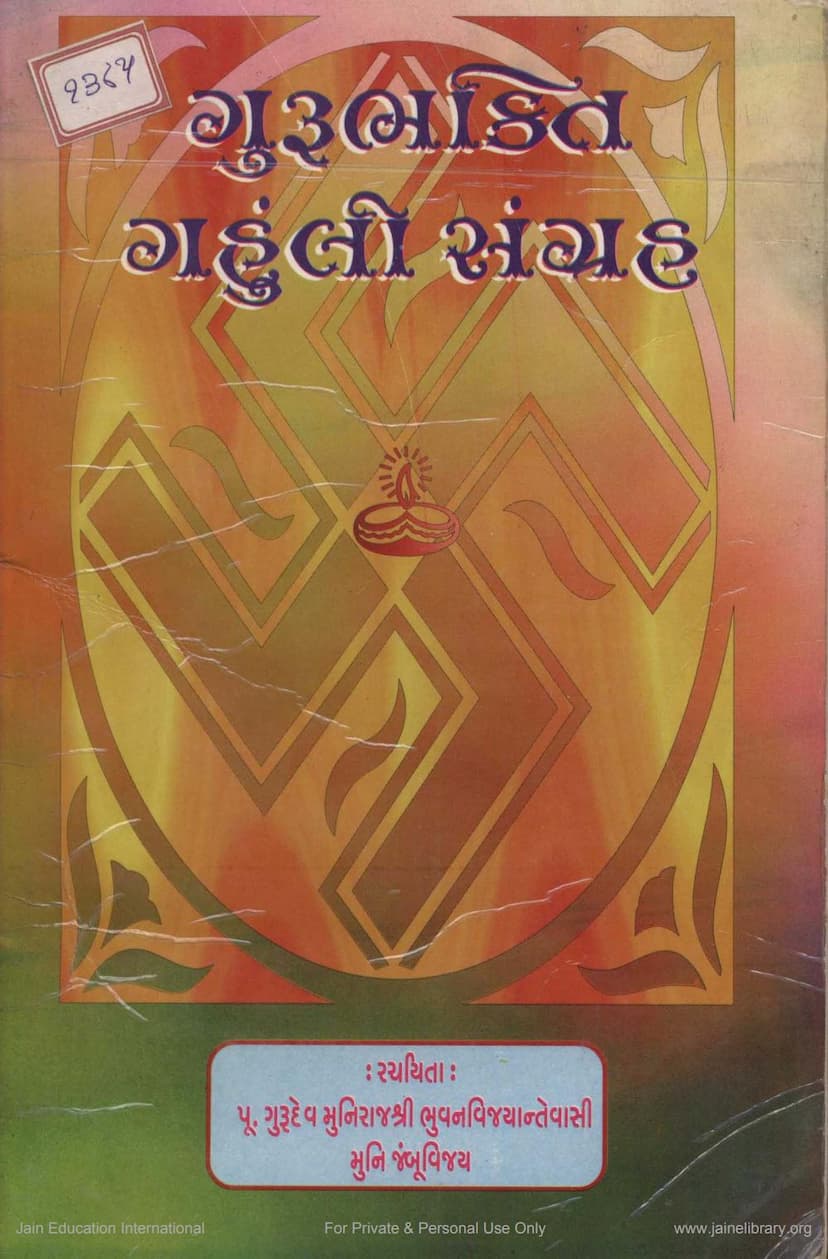Gurubhakti Gahuli Sangrah
Added to library: September 1, 2025

Summary
Here's a comprehensive summary of the Jain text "Gurubhakti Gahuli Sangrah" by Muni Jambuvijay, based on the provided pages:
Title: Gurubhakti Gahuli Sangrah (Collection of Songs/Verses on Devotion to the Guru)
Author: Muni Jambuvijayji (disciple of Muni Bhuvanvijayji)
Publisher: Shree Parsh Computers, Ahmedabad
Overview:
"Gurubhakti Gahuli Sangrah" is a collection of devotional songs and verses ("Gahuli") dedicated to expressing deep reverence and devotion to the spiritual teacher (Guru). The compilation aims to highlight the noble qualities, teachings, and the guiding role of the Guru in the spiritual journey of a disciple. The text is structured as a series of individual songs, each with a specific theme related to Guru devotion.
Key Themes and Content:
The book is a testament to the author's (Muni Jambuvijayji) profound respect and love for his Guru, Muni Bhuvanvijayji. The songs cover a wide spectrum of themes central to Jain philosophy and the Guru-disciple relationship:
- Praise of the Guru's Qualities: Many songs are dedicated to extolling the virtues of the Guru, such as his knowledge, wisdom, compassion, renunciation, adherence to vows, and his ability to guide beings towards liberation. Phrases like "Guru is a treasure of virtues," "Guru shows the path to heaven," and "Guru's words are like nectar" are frequently found.
- The Guru as a Spiritual Guide: The Guru is depicted as the illuminator of spiritual knowledge, dispelling the darkness of ignorance. He is seen as the one who shows the path to Moksha (liberation) and helps devotees cross the ocean of suffering (Bhavsagar).
- The Power of the Guru's Teachings: The verses emphasize the profound impact of the Guru's teachings, which are described as nectar, a source of knowledge, and the means to overcome worldly attachments and afflictions. The songs often encourage listeners to imbibe these teachings and apply them in their lives.
- Devotion and Surrender to the Guru: The collection underscores the importance of devotion, reverence, and surrender to the Guru. Many songs express the desire to constantly remember and worship the Guru, considering him the savior and the ultimate refuge.
- Jain Philosophy and Principles: Interwoven with the theme of Guru devotion are references to core Jain principles like Ahimsa (non-violence), the importance of the three jewels (Samyak Darshan, Samyak Gyan, Samyak Charitra), the path of renunciation, and the cycle of birth and death.
- Specific Teachings and Narratives: The later sections of the book include "Gahulis" related to specific Jain scriptures like the Kalpa Sutra and the life stories of revered Tirthankaras (Lord Mahavir, Lord Parshvanath, Lord Rishabhdev, Lord Neminath) and prominent monks and nuns, all presented through the lens of Guru's teachings. This indicates that the Guru often expounded upon these scriptures and lives.
- Occasional Devotion: Some songs are framed around specific occasions like Paryushan Parva, Diwali, and Gyan Panchami, highlighting how the Guru's teachings are relevant and celebrated during these significant periods.
- Personal Gratitude: The "Prastavana" (Preface) reveals the personal journey of the author in compiling these songs, which were initially composed by his Guru during a monsoon retreat. The act of re-publishing them is seen as an act of merit and a way to spread the Guru's teachings further.
Structure and Style:
The book is organized as a series of numbered verses or songs, each set to a specific musical "Raag" (tune), as indicated by the parentheses. This suggests that these "Gahulis" were intended to be sung, making the devotional message more accessible and engaging. The language is devotional, poetic, and filled with imagery, reflecting a deep emotional connection to the Guru and the spiritual path.
In essence, "Gurubhakti Gahuli Sangrah" is a devotional anthology that celebrates the transformative power of a Guru in the spiritual life of a Jain disciple. It serves as a guide for expressing devotion, understanding Jain principles through the Guru's teachings, and remembering the Guru's invaluable contribution to spiritual enlightenment.